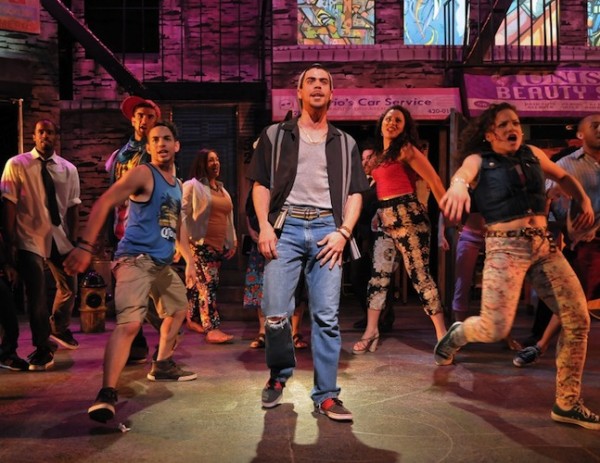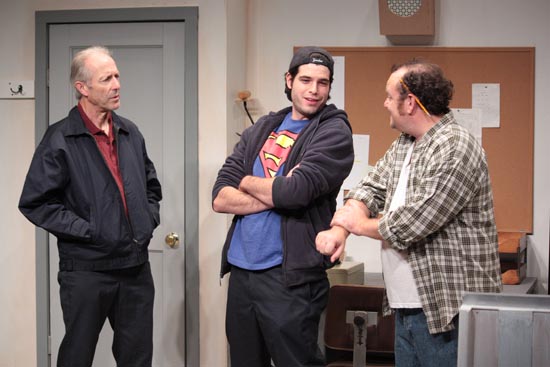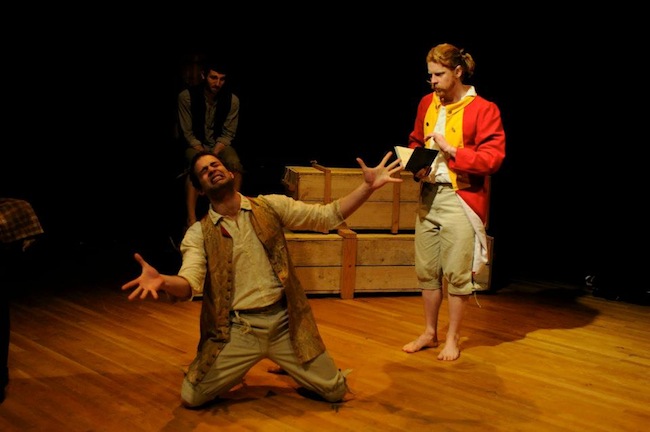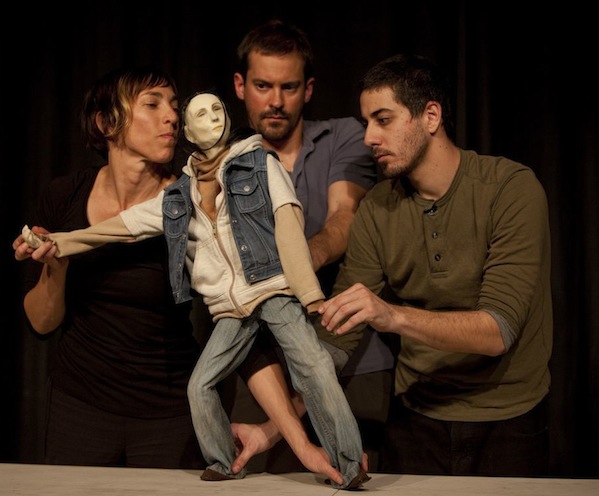Theater Feature: Best Stage Productions of 2013
Fuse Theater critics pick some of the outstanding shows of the past year.

Diego Klock-Perez (center) and the cast of SpeakEasy Stage Company’s “In the Heights.” Craig Bailey/Perspective Photo.
By Arts Fuse Critics
My top five nominations for best plays of the season:
1) Driving Miss Daisy, by Alfred Uhry, performed at Gloucester Stage Company, Gloucester, Mass. A pitch-perfect production starring Lindsay Crouse, Johnny Lee Davenport and Robert Pemberton, directed by Benny Sato Ambush. Sometimes everything conspires to make a production work — and this was one shining example of excellence, without a wrinkle or an off-note.
2) In the Heights, by Lin-Manuel Miranda and Quiara Alegria Hudges, performed at SpeakEasy Stage Company, directed by Paul Daigneault at Boston Center for the Arts, Boston. In your face raw energy and outstanding performances made this production memorable, edgy and rewarding. Fuse review
3) Trojan Women (After Euripides), performed by Siti Company, at ArtsEmerson’s mainstage, Parmount Theatre, Boston, directed by Anne Bogart. If theatre can be seen as as a bright light illuminating the dark space around our lives, then this production burned as if emitted from a soldering iron, seering images into our minds.
4) Mies Julie, written and directed by Yael Farber, performed by Baxter Theatre Center at the University of Cape Town, South Africa, at the ArtsEmerson mainstage in Boston, based on Strinberg’s Miss Julie. Two lovers taunt, caress, flail, entice, and finally copulate on stage in a production that assaulted the senses and left scars on the soul. Fuse review
5) An Iliad, by Denis O’Hare and Lisa Peterson, starring Denis O’Hare, ArtsEmerson mainstage, Paramount Theatre, Boston. War is hell, and Denis O’Hare, in a one man show tell us why, using the ancient art of storytelling handed down to him from the muses, and delivered unflinchingly, until we were left gasping for air. Fuse Review
— Robert Israel
Robert Israel writes about theater, travel and the arts, and is a member of Independent Reviewers of New England (IRNE). He can be reached at risrael_97@yahoo.com
6) The Glass Menagerie – now in New York but which originated at the American Repertory Theater in Cambridge, MA. One of the very best things I have seen in years, giving the play its full weight without being in any way weighty. Cherry Jones is an extraordinary actress and her interpretation of Amanda Wingfield will go down in the annals of great theater of the 21st Century.
— Roberta Silman
Roberta Silman is the author of Blood Relations, a story collection now available as an ebook; three novels, Boundaries, The Dream Dredger, and Beginning the World Again; and a children’s book, Somebody Else’s Child. She writes regularly for The Arts Fuse and can be reached at rsilman@verizon.net.
Of the productions that I saw, I agree with Roberta Silman and Iris Fanger that the A.R.T’s The Glass Menagerie was one of the year’s best, though I found Zachary Quinto to be an irritatingly surly Tom. The knot-headed counterculture musical Pippin at the A.R.T. was the most overrated production of the year. I would also like to add:
7) Who’s Hungry – Dan Froot and Dan Hurlin’s ongoing, multipart performance piece explores, through puppets, multimedia, and visual imagery, what it is like to be hungry in America. The documentary presentation draws on real life stories from those who are struggling to survive. Sometimes the approach is a bit too arty (and apolitical) for its own good, but this project is a valuable rebuke to the expanding escapism of contemporary theater. Alas, the show only played for three performances at the Charlestown Working Theater. Arts Fuse feature
8) Pygmalion – A splendid staging at the Williamstown Theatre Festival (directed by Nicholas Martin) of George Bernard Shaw’s delightful anti-romance that even in these supposedly post-feminist days poses somewhat of a problem, particularly when a production has to tackle the script’s elemental demand: that the audience should not yearn that Eliza, once she gains her self-respect and independence, remain on speaking terms, let alone stay with, her tyrannical teacher, Henry Higgins. Martin generally got Shaw’s prickly approach right, until the final scene. Fuse Review
— Bill Marx
If beauty is in “the eye of the beholder,” perhaps “best” is a personal standard as well. A list of some memorable productions of 2013, in a backward chronology follows:
8) Julie Taymor’s production of A Midsummer Night’s Dream at Theatre for A New Audience, Brooklyn, NY, proved that she has not lost her theatrical acuity.
9) The Heart of Robin Hood at American Repertory Theatre,a is a hoot of a re-working of the familiar legend, with a formidable Maid Marion, leaning in and flipping out. Fuse Review

Al (from left) eyes Lester and Vic suspiciously because money has been disappearing from the cash register in “Windowmen.” Photo: Boston Playwrights’ Theatre
10) Windowmen, a new play by local actor turned playwright, Steven Barkheimer, based on his experiences working at Fulton Fish Market, was wonderfully cast. The all-male troupe was led by Will Lyman as the tough boss, the others in the cast included Brandon Whitehead, Daniel Berger-Jones, Nael Nacer, and Alex Pollack as the newbie who learned his lessons fast.
11) Tribes at SpeakEasy Stage featured James Caverly in a heart-breaker of a performance as the hearing challenged son of a dysfunctional family. Erica Spyres played the woman who comes to his rescue. Fuse Review
12) The Hypocrites production of Pirates of Penzance at American Repertory Theater was a sweetly silly re-invention of Gilbert and Sullivan. Fuse Review
13) Andre De Shields graced the stage as the King of the Baboons in the wildly popular musical production of The Jungle Book at the Huntington Theatre Company, with Thomas Derrah in the role of a delightfully seductive serpent. Bucks from Disney helped fuel this show, which is probably on its way to New York. Stay tuned. Fuse Review
14) At the Williamstown Theatre Festival last summer: a pre-Broadway try-out of a musical adaptation of the novel The Bridges of Madison County was set to a sensitive and lovely score by Jason Robert Brown. Steven Pasquale in the role of the photographer continues with the show in New York, but Elena Shaddow who turned in a fine performance as the Iowa housewife in the WTF staging does not, to be replaced by a more bankable star, Kelli O’Hara.
A shout-out to two friends who appeared on local stages:
Tufts University theater professor Laurence Senelick appeared as the derelict dying of ennui and habit in Samuel Beckett’s Krapp’s Last Tape at Balch Arena Theater, Tufts, March 12-13.
Operation Epsilon, a play by M.I.T. theater professor and playwright Alan Brody, was well produced at Nora Theatre with a cast of 11 men, led by Will Lyman and Diego Arciniegas, playing two of the ten German scientists sequestered after World War II in a rural house in Britain. Fuse Review
— Iris Fanger
Iris Fanger is a theater and dance critic based in Boston. She has written reviews and feature articles for the Boston Herald, Boston Phoenix, Christian Science Monitor, New York Times, and Patriot Ledger as well as for Dance Magazine and Dancing Times (London).
Former director of the Harvard Summer Dance Center, 1977-1995, she has taught at Lesley Graduate School and Tufts University, as well as Harvard and M.I.T. She received the 2005 Dance Champion Award from the Boston Dance Alliance and in 2008, the Outstanding Career Achievement Award from the Graduate School of Arts and Sciences at Tufts. She lectures widely on dance and theater history.
Here are my additions to the top-more-than-ten.
15) Total Verrückt: Charlestown Working Theater continued its long association with Double Edge Theatre in Ashfield, Massachusetts by presenting this piece, written and performed by Double Edge artist-in-residence Joanna Caplan, and directed by company member Matthew Glassman. Set in the Westerbork Transit Camp in the Netherlands, the piece is inspired both by the journalistic accounts of Dutch-Jewish poet and mystic Etty Hillesum and the performances of German-Jewish cabaret stars who had fled to Holland after the 1933 election of a Nazi government, only to find themselves again subject to Nazi policies when Germany invaded the Netherlands. I did not review the piece because I moderated the post-show discussion with Caplan and Glassman. The weirdness of physical comedy routines, object theatre, and cabaret standards, such as the dance of Salome as metaphors for the Holocaust, was striking in its audacity and execution. Caplan is an articulate physical performer and an intelligent, morally engaged artist.

Jesse Wood, Zachary Eisenstat and Mac Young in Whistler in the Dark’s staging of “Our Country’s Good” at Charlestown Working Theater.
16) Our Country’s Good: Whistler in the Dark’s production of Timberlake Wertenbaker’s story set during the British colonization of Australia makes a strong case that epic theater offers an ambitious alternative to the formulaic family dramas, office dramas, two-handers, and morality plays with easy answers that are the current vogue in the American world of new scripts. The play, directed by Meg Taintor at Charlestown Working Theater, revolves around a British officer’s attempt to reform the inmates at the penal colony by having them act in a production of George Farquhar’s The Recruiting Officer. The play poses questions for which we often assume we have the right answers: What is the good of theater? Is it to entertain? To communicate a nation’s values? To morally uplift? What is the good of a penal system? To punish the wicked for their wickedness? To punish the poor and marginal for being poor and making them even more marginal? To reform the wicked? To segregate the criminal element and safe-guard society?
17) Given the number of words I have expended already covering Guy Ben-Aharon’s projects, there is no hiding my admiration for his work. Quite simply, among his Israeli Stage, German Stage (which he co-produces with the Goethe-Institut Boston), and now Swiss Stage (with Swissnex, the Swiss consulate) he is doing more to expose Boston audiences to contemporary foreign plays than anyone in town. Given the consistent quality of the scripts and casts, it’s hard to single a production out. So I will salute two: Marianna Salzmann’s Mameloschn presented by the German Stage, which portrayed three generations of Jewish women living in East, and later unified, Germany after WWII; and, with Israeli Stage, Hanoch Levin’s The Whore From Ohio which, were I to describe it as a ribald offspring of Scheherazadee and Samuel Beckett, would only scratch the surface. With some of our city’s larger cultural institutions having more money than they can spend in a responsible manner, some patrons of the arts need to step up to the plate and put their philanthropy where it can do the most good — so that Ben-Aharon can present some full productions in addition to staged readings.
18) I am reluctant to place Hub Theatre Company of Boston’s presentation of William Gibson’s Goodly Creatures on my list for the simple reason that I worked with the company and director John Geoffrion on their production of Israel Horovitz’ Lebensraum earlier in the season. But it’s important to note that this play about the religious schism amongst the Puritans of the Massachusetts Bay Colony is both geographically relevant (the entire play takes place within a leisurely walk of the performance space at the First Church in Boston) and culturally illuminating, particularly given that many liberal secularists in the Northeastern urban centers spend little time pondering the world view of fundamentalists, whatever their religion.
— Ian Thal
Ian Thal is a performer and theatre educator specializing in mime, commedia dell’arte, and puppetry, and has been known to act on Boston area stages from time to time, sometimes with Teatro delle Maschere, and on occasion served on productions as a puppetry choreographer or dramaturg. He has performed his one-man show, Arlecchino Am Ravenous, in numerous venues in Massachusetts and Rhode Island, and is currently working on his second full length play; his first, though as-of-yet unproduced, was picketed by a Hamas supporter during a staged reading. Formally the community editor at The Jewish Advocate, he blogs irregularly at the unimaginatively entitled From The Journals of Ian Thal, and writes the “Nothing But Trouble” column for The Clyde Fitch Report.

